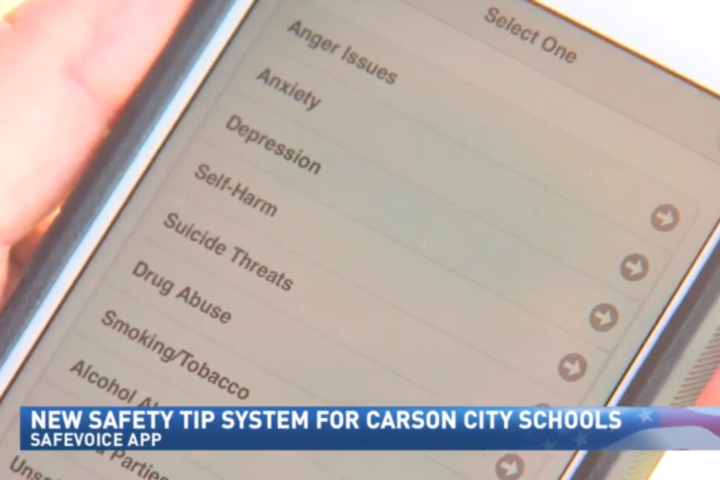School officials across Nevada are launching a new smartphone app that allows students to anonymously report a variety of safety concerns to the proper authorities.


School officials across Nevada are launching a new smartphone app that allows students to anonymously report a variety of safety concerns to the proper authorities.
Students in Carson City and elsewhere were greeted with posters for “SafeVoice,” an app designed by the Nevada Department of Education that’s designed to give students an anonymous way to report threats of violence, self-harm, drug use, bullying or other problems, KRNV reports.
The notifications are then forwarded to the Department of Public Safety, which evaluates whether police involvement is necessary and alerts school officials.
SafeVoice debuted in January and is currently in about half of the state’s schools. Over the summer state officials received about 2,700 tips, with use expected to increase as students head back to class.
“Every tip is important. Every tip is evaluated by the Department of Public Safety and pushed through to the school,” Nevada DOE Safevoice coordinator Sarah Adler told the news site. “While it may seem frivolous to us, it may add a piece of information at the school level that connects with other pieces of information, and now we start to put a picture together about vulnerable kids.”
SafeVoice is accessible 24 hours a day, seven days a week, every day of the year, and students can report issues they’re struggling with both on and off school grounds.
Richard Stokes, superintendent of Carson City schools, told KRNV he hopes the app empowers students to take action to improve their school communities.
“We want students to speak up for their friends and themselves to stop bullying, support students in crisis, and above all, prevent school violence,” he said. “When it’s not possible to come to school leaders directly, we want students and parents to use SafeVoice.”
KRNV notes that Nevada law requires all school to eventually implement the program, which affirms officials are focusing on what most parents consider a top priority: safety.
James Davison Hunter, founder of the Institute for Advanced Studies in Culture, explained why a unified message centered on issues of character are typically the most effective when he wrote about such matters in “The Tragedy of Moral Education in America”:
Moral education can work where the community, and schools and other institutions within it, share a moral culture that is integrated and mutually reinforcing; where the social networks of adult authority are strong, unified, and consistent in articulating moral ideas and their attending virtues; and where adults maintain a ‘caring watchfulness’ over all aspects of a young person’s maturation.
The Nevada DOE website SaveVoiceNV.org offers more information for parents, students, schools, law enforcement, community members and others working to improve student wellness and prevent violence and other negative influences on learning.
The site also provides links to helpful resources including internet safety pledges, the “Bully Free Zone,” and other information on physical needs, safety, belonging and self-esteem from the state’s Office of Safe and Respectful Learning.